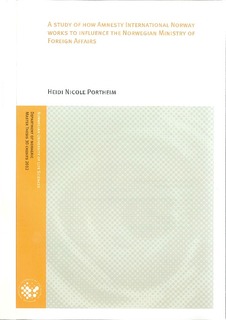| dc.description.abstract | Within global governance theory there is a consensus that nongovernmental organisations (NGOs) have an important role in creating national and international policies. The literature on the relationship between the Norwegian state and NGOs has been dominated by questions around state funding. This thesis serves two purposes; it gives a thick description of an NGO that actively tries to influence state policy, and it describes the power relations between the Norwegian state and an NGO that does not receive government funding. Understanding how Amnesty International Norway works to influence the Ministry of Foreign Affairs and at what policies they focus on is important to reveal how independent they are, and how much power they bestow. This study not only maps out the power relations between a state and a financially independent NGO. It also explains why the relationship is as it is.
I spent six weeks at the AIN office in Oslo as a participant observer. I also did qualitative interviews with central actors at the AIN office and the MFA. In addition to observations and interviews, I went through official correspondence between AIN and the MFA. Through my research I discovered that the structure of Amnesty International and Amnesty International Norway mirrors and supports the state system. This means that the MFA overpowers AIN as the state has created the political system in which the actors operate. AIN pushes the MFA in cases where results are likely, and in this way the MFA indirectly steers the actions of the organisation. However, despite the fact that the MFA has more power than AIN, Amnesty International Norway has an array of ways in which they are able to influence MFA policies. This includes using intergovernmental organisations, building personal relationships and affecting public opinion. AIN’s knowledge and independence makes them an actor with political leverage.
This thesis argues that there are several ways in which a state can exercise power over an NGO, and that this dominance does not rely on a financial dependency on the part of the NGO. It also argues that although a state may be the most powerful in a relationship with an NGO, this does not mean that the NGO does not have influential power. In a democratic country where voters have political significance, an NGO has a lot to gain in influencing public opinion. | no_NO |
